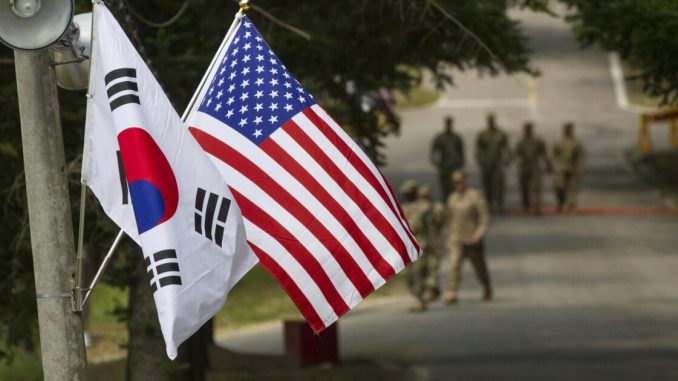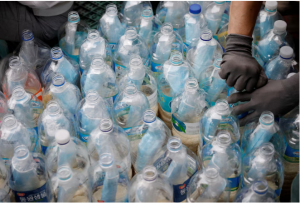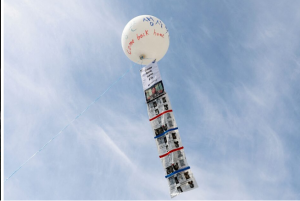
Credit: Staff Sgt. Ken Scar
| Published August 26, 2025
Six U.S. citizens are facing prosecution in South Korea after being detained for attempting to send bottles filled with food, money, and religious materials across the sea to North Korea. The incident took place on June 27, 2025, near Ganghwa Island, a location west of Seoul that sits close to the maritime boundary with the North.
Authorities allege that the group tried to release more than 1,000 plastic bottles into the water, hoping currents would carry them to the North. Inside the bottles were bags of rice, one-dollar bills, miniature Bibles, and USB sticks. Officials stated the action may have violated the nation’s Framework Act on the Management of Disasters and Safety, a law that regulates activities in zones considered risky.
The Americans, reportedly Christians aged between 20 and 50, said their goal was to provide food for the hungry and deliver scripture to people living under harsh restrictions in the North. However, prosecutors argue that such actions could provoke tensions between the two Koreas and pose safety concerns.
If convicted, the individuals could face up to one year in prison or a fine of about 10 million won (roughly 7,500 U.S. dollars). The U.S. Embassy has not commented publicly on the case, and the identities of the six remain undisclosed.
This episode comes as South Korea’s new administration seeks to reduce cross-border hostilities by curbing activist campaigns such as balloon launches and bottle drops. These efforts, while often framed as humanitarian, have long been a source of friction, with North Korea reacting sharply to outside attempts to send materials over the border.
The situation remains under review, with prosecutors determining the next steps. For now, the case highlights the delicate balance between humanitarian activism and the geopolitical realities of the Korean Peninsula.

Members of North Korean defector group Kuensaem fill empty plastic bottles with rice and masks, during preparations for an event to send the bottles towards the North, in Seoul, South Korea, June 18, 2020. REUTERS/Kim Hong-Ji/File Photo Purchase Licensing Rights

A view of a balloon with a banner with an image of North Korean leader Kim Jong Un that the group has depicted as being in jail and portraits of the abductees which are planned to be sent today near the demilitarized zone separating the two Koreas, in Paju, South Korea, April 23, 2025. REUTERS/Kim Soo-hyeon/File Photo Purchase Licensing Rights
 Implications
Implications
1. Diplomatic Implications
-
U.S.–South Korea relations: The detention and possible prosecution of American citizens could strain relations. Washington may be forced to step in, either quietly through diplomatic channels or more publicly if the case escalates.
-
Inter-Korean dynamics: South Korea has been trying to de-escalate tensions with the North. Allowing activist missions like this risks undoing progress, while prosecuting the Americans shows Seoul’s seriousness in controlling cross-border provocations.
2. Legal & Sovereignty Implications
-
South Korea’s authority: The case reinforces Seoul’s right to regulate activities near its border zones, even when foreigners are involved.
-
Precedent setting: If convicted, this could set a precedent for prosecuting not only Koreans but also international activists who attempt to defy cross-border restrictions.
3. Humanitarian & Religious Implications
-
Faith-based activism: The Americans reportedly acted out of religious conviction, wanting to deliver food and scripture. Their prosecution could be seen as suppressing humanitarian and religious expression.
-
Perception battle: Critics might argue South Korea is prioritizing political appeasement of the North over humanitarian aid. Supporters, however, may argue uncontrolled bottle drops could trigger conflict and endanger millions.
4. Geopolitical Implications
-
Message to North Korea: By prosecuting the Americans, South Korea signals to Pyongyang that it is taking steps to limit provocative activities. This could be aimed at opening dialogue or avoiding retaliation.
-
Regional security: Any cross-border tension—even symbolic—can affect not only Korea but also U.S. military interests in the region.
5. Public Opinion Implications
-
In South Korea: Citizens are divided. Some see these acts as reckless and dangerous; others sympathize with humanitarian motives.
-
In the U.S.: The case could become a talking point for debates about religious freedom, humanitarian outreach, and foreign policy responsibilities.
 Overall Takeaway:
Overall Takeaway:
The detention of six Americans in South Korea for attempting to send food, cash, and scripture across the sea to North Korea underscores the fragile balance between humanitarian ideals and geopolitical realities. What some see as an act of faith and compassion, others view as a reckless move that risks sparking conflict on one of the world’s most volatile borders.
For South Korea, the decision to prosecute is not simply a matter of law enforcement—it is a test of sovereignty, diplomacy, and its commitment to easing cross-border tensions. For the United States, the case may become a delicate diplomatic challenge, balancing support for its citizens with respect for South Korea’s legal system.
Ultimately, this episode highlights the complexity of helping those trapped under closed regimes. It raises a hard question: How can compassion be shown to North Koreans without endangering the fragile peace that holds on the peninsula?





Be the first to comment